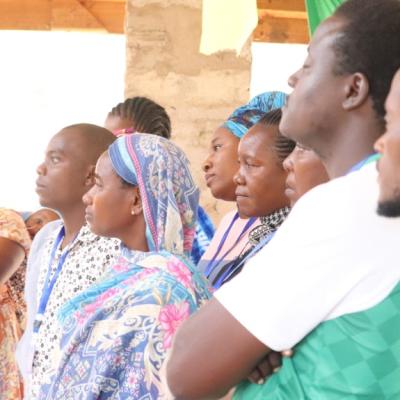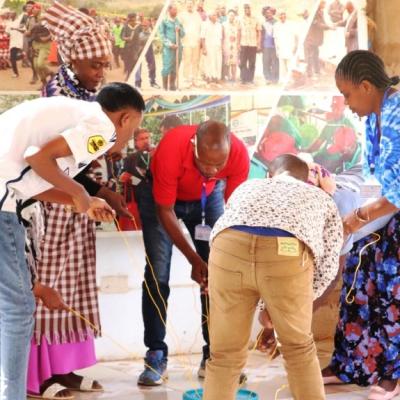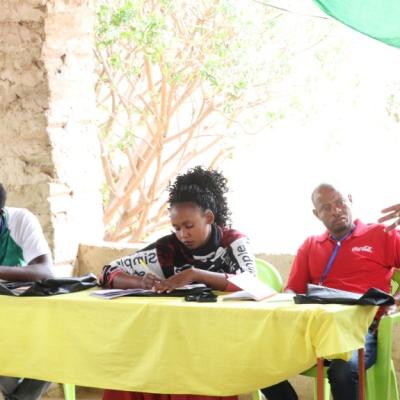On the 10th of September 2024, SJS Organic Farm had the privilege of participating in the Youth Innovation
Workshop on Agroecology and Sustainable Food Systems. The workshop, organized by Iles de Paix Tanzania under the theme "LEAVE NO ONE BEHIND", was held at the Arusha Lutheran Medical Centre (ALMC) - SELIAN Community Church Hall. During the event, Fr. Alwyn D’Souza, Director of SJS Organic Farm, delivered a compelling presentation on how to harness the strengths of Generation Z in organic agriculture and agroecology. Meanwhile, Ms. Zainab, the SJS Organic Farm Coordinator, shared her inspiring journey of resilience, encouraging the youth present to persevere in the face of challenges.
Fr. Alwyn’s presentation highlighted how critical it is to understand the uniqueness of Generation Z, the youth of today, in order to inspire and guide them effectively. Drawing on the analogy of an athlete inspiring a young schoolboy running behind him, Fr. Alwyn emphasized the responsibility of older generations to pave the way for the younger ones, ensuring that no one is left behind. This requires understanding the defining traits of each generation, especially Gen Z, and how their environment has shaped their values, behavior, and aspirations.
Generation Z (1995-2011), unlike previous generations, is tech-savvy, comfortable with information, and driven by authenticity and disruption of traditional systems. They are revolutionaries at heart, rejecting long-term goals in favor of immediate, innovative solutions. To truly empower them in the field of organic agriculture and agroecology, we must leverage their strengths in technology, innovation, and their desire for emotional wellness. Fr. Alwyn outlined several key ways to engage Gen Z in sustainable food systems and organic agriculture:
1. Leveraging Technology and Innovation
Gen Z is highly adept at using technology. By integrating smart farming tools, such as apps and AI for crop monitoring, water optimization, and soil health, we can revolutionize traditional agricultural methods. Establishing Agroecology Innovation Hubs where Gen Z can work as Local Service Providers (LSPs) will allow them to connect with organic markets, manage farms digitally, and develop creative solutions for challenges in organic farming.
2. Peer-to-Peer Education
Gen Z thrives in environments where they can learn from their peers. By creating youth-run agroecology hubs, we foster a collaborative and innovative learning culture. These hubs can operate under train-the-trainer models, where youths are educated in sustainable farming techniques and empowered to teach others. Additionally, Agriclinics can serve as entrepreneurial hubs, offering business opportunities related to organic farming.
3. Promoting Sustainable Food Systems
Engaging Gen Z in reshaping local food systems is essential for promoting sustainability. We can encourage them to set up local food networks and adopt innovative methods like urban gardens and vertical farming. These approaches not only support sustainable food production but also create decentralized food systems, reducing reliance on industrial agriculture.
4. Emotional Wellness Through Purpose-Driven Work
Gen Z places high value on emotional wellness and purpose-driven work. Organic agriculture can provide them with a sense of connection to nature, reducing stress and promoting mental well-being. Agriclinics can also serve as safe spaces for emotional support, fostering a community of care among young farmers as they navigate both innovation and personal growth.
5. Revolutionizing Organic Agriculture
With their tendency to challenge the status quo, Gen Z can introduce new farming techniques and market approaches that improve resilience and productivity in organic farming systems. Their involvement in environmental advocacy can also make them powerful voices for change, pushing for more sustainable and organic farming practices on a broader scale.
By tapping into Generation Z’s technological expertise, passion for sustainability, and focus on well-being, we can position them as leaders in agroecology and sustainable food systems. Through Agriclinics and innovation hubs, they have the potential to drive groundbreaking advancements in organic farming, while creating supportive environments for themselves and future generations.







